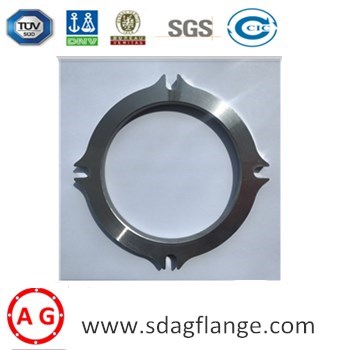Maximizing Efficiency: Professional Mill Service's Approach to CNC Flange Production
2024-03-14
In the fast-paced world of manufacturing, efficiency and waste reduction are paramount. Professional Mill Service, a leader in precision CNC machining, understands the importance of optimizing processes to deliver high-quality flanges while minimizing waste and maximizing productivity. Let's explore the strategies and techniques employed by Professional Mill Service to achieve these goals in CNC flange production.
1. Advanced Machining Technology:
Professional Mill Service invests in state-of-the-art CNC machining technology, including high-speed machining centers, multi-axis machining centers, and robotic automation. These advanced machines enable faster cutting speeds, shorter cycle times, and simultaneous machining of multiple features, resulting in increased throughput and efficiency.
2. Optimized Toolpath Strategies:
Efficient toolpath programming is essential for minimizing machining time and maximizing tool life. Professional Mill Service utilizes advanced CAM (Computer-Aided Manufacturing) software to generate optimized toolpaths that minimize unnecessary tool movements, reduce air cutting, and maximize material removal rates. This ensures efficient use of cutting tools and minimizes wear and tear, resulting in longer tool life and reduced tooling costs.
3. Fixture Design and Workholding Solutions:
Proper workpiece fixturing is crucial for ensuring stability, accuracy, and repeatability during machining. Professional Mill Service designs custom fixtures and workholding solutions tailored to each flange geometry, optimizing clamping mechanisms, and reducing setup times. This minimizes downtime between production runs and ensures consistent part quality throughout the manufacturing process.
4. Material Optimization:
Material waste can significantly impact production costs and environmental sustainability. Professional Mill Service employs efficient nesting algorithms and material utilization techniques to minimize scrap and maximize material yield. By carefully planning part layouts and nesting arrangements, the company reduces material waste and optimizes raw material usage, resulting in cost savings and environmental benefits.
5. Lean Manufacturing Principles:
Professional Mill Service embraces lean manufacturing principles to streamline workflows, eliminate non-value-added activities, and optimize production processes. Through continuous improvement initiatives such as 5S (Sort, Set in order, Shine, Standardize, Sustain), Kaizen events, and value stream mapping, the company identifies inefficiencies, reduces lead times, and enhances overall operational efficiency.
6. Real-Time Monitoring and Control:
Monitoring production metrics in real-time allows Professional Mill Service to identify bottlenecks, address issues promptly, and optimize production schedules. Advanced monitoring systems track machine uptime, cycle times, and production rates, enabling proactive decision-making and resource allocation to maximize efficiency and minimize downtime.
7. Quality Assurance Integration:
Quality control measures are integrated seamlessly into the production process to minimize rework, scrap, and waste. Professional Mill Service employs in-process inspection techniques, automated inspection systems, and statistical process control (SPC) methods to monitor part quality and ensure compliance with specifications throughout the manufacturing process. By detecting defects early, the company minimizes waste and reduces the likelihood of costly rework or rejects.
8. Continuous Improvement Culture:
At the heart of Professional Mill Service's efficiency optimization efforts is a culture of continuous improvement. The company encourages employee involvement, fosters innovation, and empowers teams to suggest and implement process enhancements. By embracing feedback, iterating on best practices, and striving for excellence, Professional Mill Service continuously raises the bar for efficiency and waste reduction in CNC flange production.
In conclusion, Professional Mill Service's commitment to optimizing efficiency and minimizing waste in CNC flange production is evident in its adoption of advanced technology, optimized processes, lean principles, and continuous improvement initiatives. By leveraging these strategies, the company not only delivers high-quality flanges to its customers but also drives operational excellence, cost savings, and environmental sustainability in the manufacturing industry.



